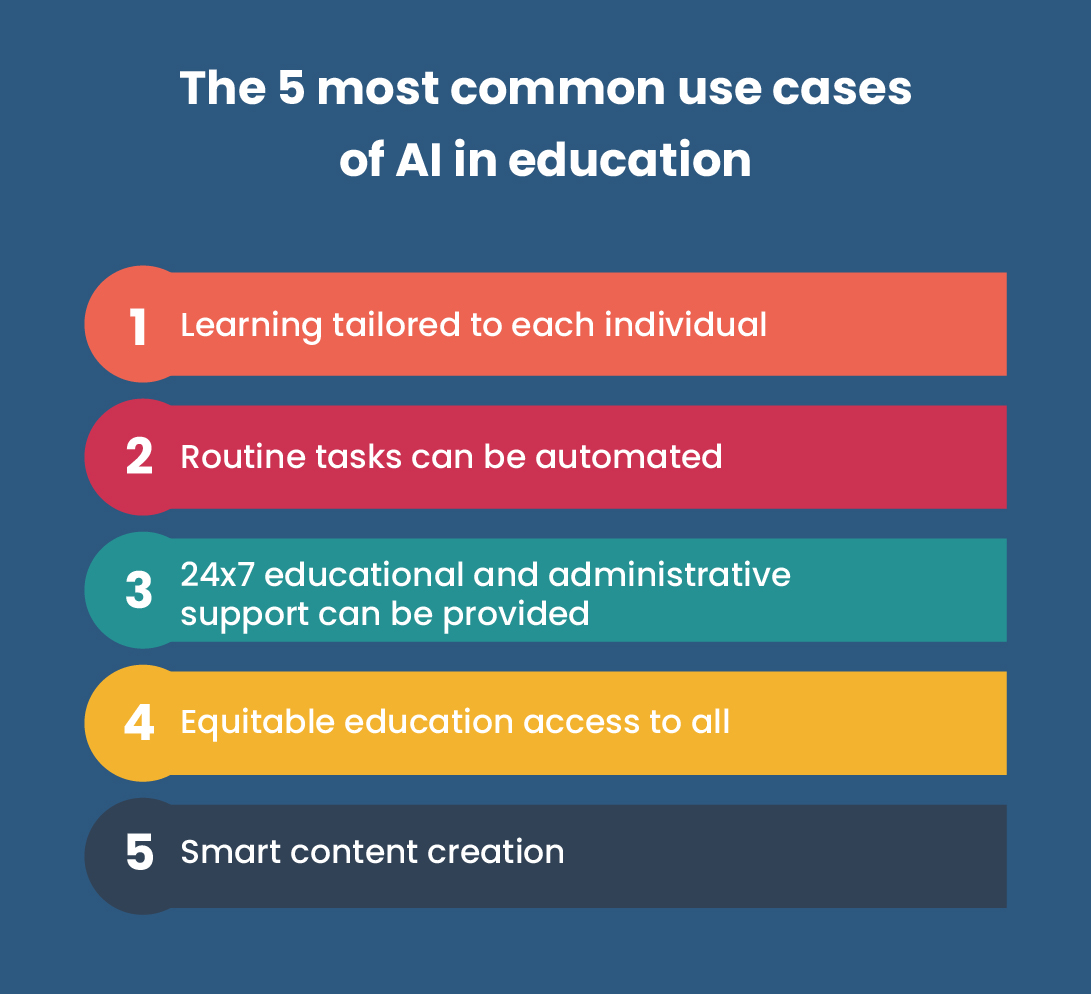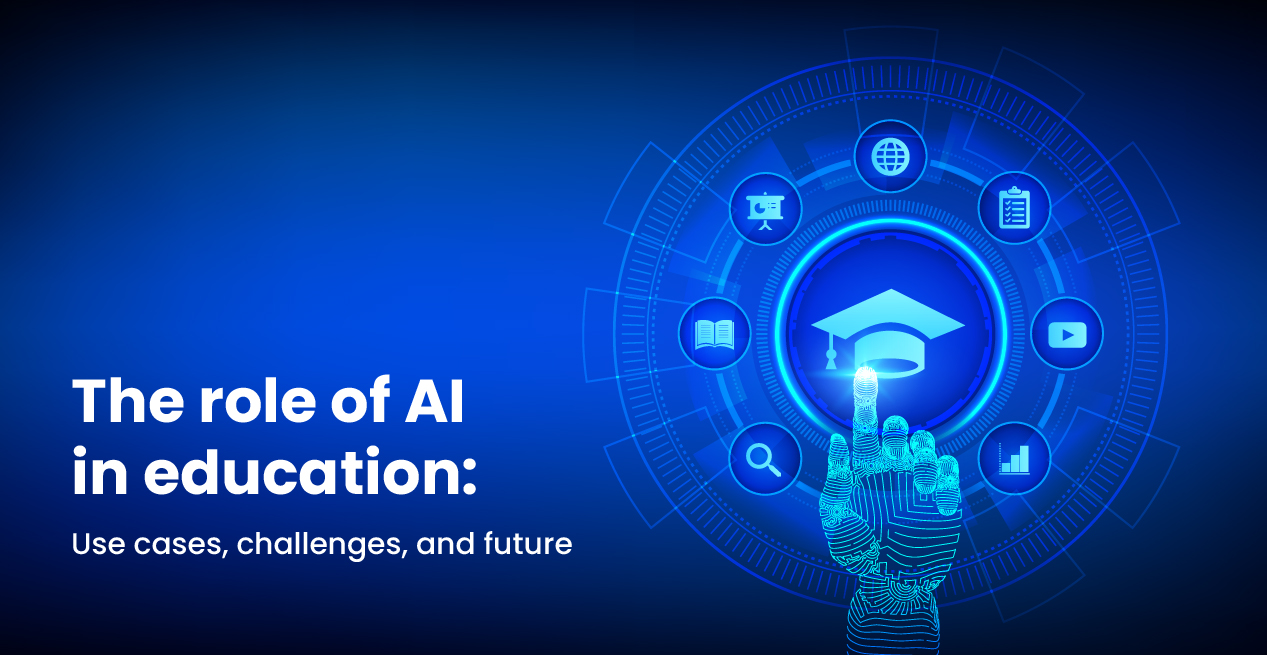We are living in the era of Artificial Intelligence (AI) with tools such as ChatGPT, Google Bard, and Midjourney. AI is reshaping industries and revolutionizing the way we work, learn, and communicate. The rapid advancement of technology underscores the importance of AI in education. In our daily lives, the concept of AI is becoming more and more prevalent, it can improve student engagement and teaching styles no matter how students learn. AI can be integrated into the curriculum to ensure that all students are prepared not only for their academic futures but also for their long-term careers. This article will explain how Artificial Intelligence is being used in education and what future holds for it.
What is AI in education?
The use of AI in education aims to improve learning outcomes as well as support teachers in developing better educational practices. AI technology can help educational institutions in a variety of ways, from automating assignment grading to designing curriculums. With the advent of AI education software development, traditional teaching methods have been transformed, from mobile digital courses to online resources and virtual classrooms. The adoption of AI technology in EdTech is increasing, so it’s time to explore the benefits and applications of AI for education app development.
AI in Education: Most Common Use Cases
Traditional methods of teaching and learning have been revolutionized by AI. It helps in creating personalized and interactive learning experiences. Let’s have a look at the most common applications of AI in education.

1. Learning tailored to each individual
One of the most significant achievements in education is the use of AI to personalize learning. This allows for a more comfortable, smoother, and more personalized learning experience. Learning in AI can help students personalize their courses and programs according to their unique experiences and preferences. With personalized learning, students are able to engage in deeper learning based on their interests, abilities, knowledge levels, and talents. The goal is to keep students motivated and successful, as well as empower them to speak out and make choices. This is why personalized learning is so popular in schools today. Students with special needs can get more from personalized AI-based recommendations. They are getting more attention from AI than they can get from teachers, which is a win-win situation.
2. Routine tasks can be automated
A major benefit of Artificial Intelligence in education is that it reduces the amount of time and effort professors and teachers need to spend managing the classroom environment. It also helps in performing numerous administrative and organizational tasks, such as filling out paperwork, making student progress reports, and preparing lectures and resources. Manually, they are time-consuming.
As per a Telegraph survey, teachers spend 31% of their time planning lessons, grading tests, and handling administrative tasks. Teachers could delegate these iterative tasks to Artificial Intelligence, allowing them to streamline manual processes, receive more time for personalized instruction, and use AI-recommended learning materials. Fortunately, most of these processes can be automated or at least semi-automated using natural language processing solutions.
3. 24×7 educational and administrative support can be provided
The majority of students seek extra help outside of class hours. It is difficult for teachers to devote enough time to each student. Using AI-powered chatbots, students can quickly get answers to their most frequently asked questions. Conversational Artificial Intelligence can be a win-win situation where tutors can save time answering questions and students can reduce waiting times for responses or searching for answers in learning materials.
In the education sector, several AI-powered chatbots have been developed with the help of Generative AI services. Machine learning technology helps by answering students’ questions around the clock and they are becoming more and more effective over time. A chatbot provides accessibility for all students, anytime and anywhere, allowing them to learn at their own pace, and providing individualized and focused instruction.
4. Equitable education access to all
Through the use of Artificial Intelligence in education, students who cannot attend school, who need to learn a subject unavailable in class, or who want to learn another subject can access education more easily. With AI tools, educational classrooms can be made available globally to all students, whether they have visual or hearing impairments or even if they speak a different language. Students can have real-time subtitles for everything the reader says using a PowerPoint plugin such as Presentation Translator.
The accessibility checker provides educators with an easier way to provide access to students with low vision. Machine learning and Artificial Intelligence can identify what is in an image and create a caption for it. With natural language generation, machines can describe pictures in human language using technology. Automated captioning on images can save much time and make the content more accessible with such machine learning technology.
5. Smart content creation
The role of Artificial Intelligence in content creation is vital. With the help of AI, educators can create and curate engaging and innovative content for their students. With AI-powered content creation tools, educators can create visually appealing and interactive learning materials in 2D and 3D. This enhances the students’ understanding of complex concepts and enables them to engage more effectively with the material.
Additionally, AI can enable the creation of bite-sized digital materials that are readily accessible and comfortable to use on a variety of devices. In this way, students can access learning materials at any time, anywhere, and on any device.

AI in Education: Challenges and Concerns
Using AI in education has many benefits, but there are also ethical considerations. One major concern is the possibility that AI will perpetuate existing bias and discrimination in education. There are also concerns about how AI might affect student privacy and data security.
Additionally, educators have noted that the chatbot can generate meaningful responses to assessment and exam questions. There are often no identifiable sources for these responses – making it hard to detect plagiarism.
The technological advancement in the education sector may also lead to job displacement. Many administrative tasks are being automated, which could reduce the number of positions available for educators and support staff. Assuring equal access to AI-powered education is also a challenge. It is imperative to ensure that no student is excluded from access to online education and educational resources owing to the rise of online education and educational resources available online.
The future of AI in Education
The future of the industry will be shaped by AI-driven education, which disrupts traditional teaching and learning approaches. Artificial Intelligence for education uses sophisticated algorithms to analyze enormous data sets and provide personalized and adaptive learning experiences. With augmented and virtual reality, students can learn on their own, get immediate feedback, and utilize immersive technologies such as individualized learning.
The use of conversational AI in education, such as chatbots and virtual tutors, promotes independent learning by providing quick assistance. Artificial Intelligence chatbots are revolutionizing education. Students can get instant, personalized support with these chatbots, which use natural language processing algorithms and machine learning algorithms to answer their questions and assist them with their learning. It is easier for students to grasp concepts when learning experiences are interactive and engaging.
In EdTech, AI trends are fueling rapid growth through improved student engagement through customized courses, interactive lectures, gamified classrooms, etc., leading to a $20 billion market by 2027. By 2023, the global e-learning market is expected to generate $166.60 billion in revenue. Educational institutions can remain competitive by applying the latest trends with the help of a software development company.
Leverage the Benefits of AI in Education with OpenXcell
If you are looking to reap the full benefits of AI in your education business, consider AI software development and ML services to improve your education business. This is a smart investment that offers a long-term return on investment. As a pioneer in education app development, OpenXcell has a deep understanding of the current educational landscape. We have also worked with prestigious businesses in the education sector like Byju’s.
By combining domain knowledge with Artificial Intelligence expertise, we can develop applications that enhance teacher-student collaboration and personalize learning experiences. Let our AI experts help you leverage the benefits of AI in education today.









